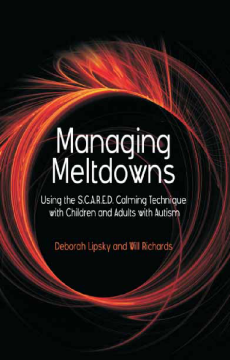
Additional Information
Book Details
Abstract
In a chaotic or threatening situation, fear is the primary emotional response of an autistic individual. Often the initial physical response is to freeze. 'Meltdowns', or brain overloads can be scary for the individual with autism, and for the person trying to help if they don't know how to react in this situation. Common coping strategies, such as hand flapping or leg shaking, can be misperceived as being wilful, noncompliant, and uncooperative; and some techniques commonly recommended during times of distress or crisis, such as maintaining eye contact or using light touch, can be counter-productive rather than providing relief.
Using the easy-to-remember acronym S.C.A.R.E.D, coined by clinical psychologist Will Richards, this guide offers strategies and practical techniques that will be a valuable reference tool to anyone in a first response position. The authors have created a training programme to explain the autistic experience and mindset, and guide the interventions of first responders to autistic individuals in crisis.
This is a small book packed full of thought provoking anecdotes and observations and with practical and useful ideas and strategies.
NAPLIC Newsletter
this is a well-thought-out book which contains much useful advice for helping someone who is having a meltdown, along with tips on how to prepare other people to give you help if you are the person suffering... a very useful little book which I suggest anyone who struggles with meltdowns can benefit from reading, especially if you can recommend it to your carers and support workers.
Asperger United
The book is written by Deborah Lipsky, an adult with high-functioning autism, and Will Richards, a psychologist who specializes in autism. Together they provide their personal insights into understanding meltdowns and strategies for responding. It is narrated from Ms. Lipsky's perspective and provides personal accounts resembling Temple Grandin's descriptions of her experiences... One of the strongest contributions of this book is the insight it provides into understanding the emotional experiences of individuals with autism... this is a fast read overall. Anyone working in the field of autism or with a child in the autism spectrum would benefit from understanding the concepts and ideas that are presented.
Carla Mazefsky, Department of Psychiatry, Center for Excellence in Autism Research, University of Pittsburgh School of Medicine
This interesting quick read gives a good insight into the mind of an individual with autism when facing a threatening situation. Deborah Lipsky is a high-functioning individual with autism and her own life-experiences help to illustrate the strategies outlined. Deborah emphasizes the need for routine and ritual and explains what happens when these break down.
Speech & Language Therapy in Practice
Deborah Lipsky is a high-functioning autistic individual with substantial experience in emergency and trauma management, having formerly worked as a firefighter, emergency medical technician, and reserve police officer. She is now a Continuing Education Seminar Presenter and Keynote Speaker, and is a consultant for schools, agencies, and private parties, specializing in meltdown management plans. Will Richards was a clinical psychologist in private practice in Maine, United States.
Table of Contents
| Section Title | Page | Action | Price |
|---|---|---|---|
| Foreword | |||
| Acknowledgements | |||
| What is Sphere? | |||
| 1. The Handbook | |||
| 2. Using the Standards in context | |||
| Appendix 1 Delivering assistance through markets | |||
| The Humanitarian Charter | |||
| Protection Principles | |||
| The Core Humanitarian Standard on Quality and Accountability | |||
| Water, Sanitation and Hygiene Promotion (WASH) | |||
| Food Security and Nutrition | |||
| Shelter and Settlement | |||
| Health | |||
| Annexes | |||
| Annex 1 Legal foundation to Sphere | |||
| Annex 2 The Code of Conduct for the International Red Cross and Red Crescent Movement and Non-Governmental Organisations (NGOs) in Disaster Relief | |||
| Annex 3 Abbreviations and acronyms | |||
| Index |
